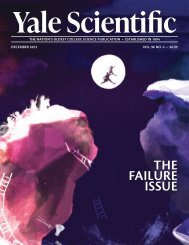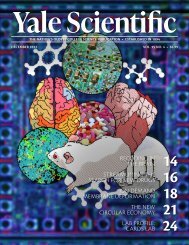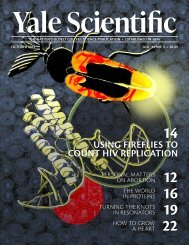YSM Issue 95.1
You also want an ePaper? Increase the reach of your titles
YUMPU automatically turns print PDFs into web optimized ePapers that Google loves.
Environment & Technology / Psychology
NEWS
A HOLISTIC MODEL
OF ELECTRIC
VEHICLE CARBON
EMISSIONS
STRESSED OUT?
YOU COULD BE
AGING FASTER
BY TIFFANY LIAO
BY KELLY CHEN
IMAGE COURTESY OF AAA LIVING
IMAGE COURTESY OF WIKIMEDIA COMMONS
Electric vehicle companies like Tesla and Rivian are
making waves in the automotive industry, with Tesla
expected to surpass General Motors’ vehicle sales by 2023.
However, as the electric vehicle (EV) industry has erupted into
the spotlight, concerns regarding the indirect emissions from
the EV life cycle have emerged. While it is clear that tailpipe
emissions from combustion engines are significantly reduced
with EV adoption, the effects of indirect emissions from the full
life cycle of an EV can be difficult to capture.
Researchers at the Yale School of Environment, led by postdoctoral
researcher Paul Wolfram, have applied an integrative
approach, combining supply-demand concepts of economics
with ecology to accurately capture the effects of indirect emissions.
“Combining engineering and economics methods allows
us to capture more of the dynamics that life-cycle cost models
themselves can’t, such as market cycle and supply-demand mechanisms,”
Wolfram said.
The group found evidence contradicting concerns around the
“dirtiness” of battery life cycles stemming from raw materials
mining and a material-intensive manufacturing process. The effects
of the latter can be mitigated by recycling. The electricity
emissions of battery electric vehicles (BEVs) overall are still far
less than fossil fuel emissions. Furthermore, once the external effects
of carbon on the public are priced into both fossil fuel and
electric vehicles, EVs become the more cost-efficient option.
Ultimately, Wolfram’s work serves as a reminder that curbing
climate change requires multiple moving parts. “It’s a ripple effect—carbon
emission reduction in every sector from manufacturing
to car transport will lead to a much faster transition to
electric vehicles,” Wolfram said. ■
In popular culture, we commonly believe that stress
makes one age faster. A simple Google image search of
“stress and aging” returns pictures of presidents from
when they first started their term to a couple of years later,
the difference being a head full of gray hair.
Previous research has proven this idea to be true in patients
with high stress, including those with post-traumatic
stress disorder, trauma histories, or other mental illnesses.
Now, researchers from Yale’s Department of Psychiatry, including
psychiatry resident Zachary Harvanek, have shown
that stress makes even healthy populations age faster. Using
GrimAge—an epigenetic clock or biochemical test that correlates
with chronological age, disease, and mortality—the
researchers found that stress might contribute to accelerated
aging even before contributions from chronic illnesses start
taking a toll. In this study, most participants were white and
between 18-50 years old.
How can we slow down the effects of epigenetic aging when
stress is a pervasive element in most of our lives? “People who
have stronger emotion regulation or stronger self-control
seem to be more resilient not just to the psychological effects
of stress but also to the physical effects,” Harvanek said.
Future research could involve investigating the impact of
race and culture on epigenetic aging and testing whether
methods that build emotion regulation actually lessen the
psychological and physical effects of stress. And what can
communities like New Haven and Yale do to help with these
stress-causing factors? “The more important thing is going
to be providing those sorts of resources,” Harvanek said. ■
www.yalescientific.org
March 2022 Yale Scientific Magazine 7

















